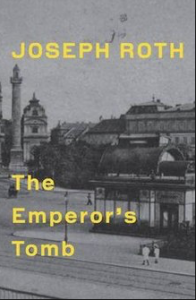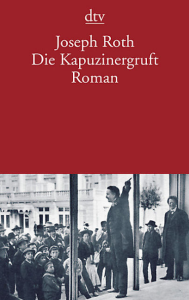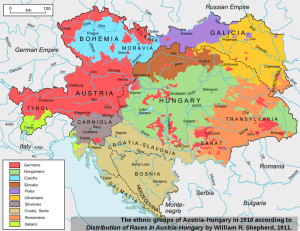

Published in 1938, Die Kapuzinergruft – The Emperor’s Tomb, was one of Joseph Roth’s last novels and the last that was published during his lifetime. Roth died in 1939, in exile, of the complications of a double pneumonia, that was possibly aggravated due to the sudden withdrawal of alcohol.
The Emperor’s Tomb tells the story of Franz Ferdinand Trotta and begins shortly before the first world war and ends with Austria’s Anschluss, the annexation of Austria into Nazi Germany. In many ways the book can be seen as a sequel to The Radetzky March, Joseph Roth’s most famous novel. Usually I would write a brief summary but since this review is part of a readalong and since Emma has already posted an excellent summary of the book, I’ll skip this part and add a link to her post instead – here.
For this post, I’d like to focus on some topics I found of interest.
WWI
As many of the readers of this blog know/may remember, for many years, I hosted a Literature and War readalong. Roth had been a chosen author in the past, even though he doesn’t portray the war as such, as rather the mental state of war, or people during war time. I ususally like this approach but in this novel, it was puzzling for several reasons. As I said before, the book begins before WWI, in 1913, and ends in 1938. While Roth describes the time before and after the war years in great detail, things get blurry from 1914 to 1918, although, allegedly, Trotta spends his years in a Russian POW camp in Siberia. If you’d never read anything about any prisoner of war camps, reading this novel would make you think it was a bit of harsher version of a boy scout camp. There aren’t any details described. No fighting happens. This is puzzling, if not bizarre. My knowledge of war literature made me assume one thing – Roth spent his WWI years sheltered. Although I own a huge Roth biography, I haven’t read it yet, but I picked it up and overflew some passages that confirmed what I suspected. He was enlisted but since he was initially considered unfit for military service, he never saw any action, but spent the war years behind a desk. Apparently, to explain why he hadn’t seen any action during the war, he pretended that he had been in Russian captivity, which isn’t true. I think this shows clearly that he must have felt guilty. While I’m not familiar with his earlier years, I know a bit about his final years, and guilt has been a defining emotion for Roth. Once it’s clear that this is why the book is so unspecific when it comes to the actual war, one can move on and concentrate on other elements. As a portrayal of the end of an era and the end of a class system, this is absolutely brilliant and nuanced. And while Trotta’s war experience lacks realism, the way he feels when he comes home doesn’t, because the strong feeling of alienation and of being a stranger in one’s own country was something many Austrians felt at that time.
Women
Before going to war, Trotta marries a girl, Elisabeth, he’d been in love with for ages. Due to a sad story, involving a servant, the marriage isn’t consummated and his new wife flees, angry. When he returns from the war, she’s not exactly keen on seeing him. Like so many women back then, she’s learned to live a life according to her own choices. She certainly doesn’t want to abandon her freedom. And she is living with another woman with whom she clearly is in a physical relationship. Trotta isn’t happy about this but he’s not prejudiced. If it had been a man, it would have been the same to him. Only he might have felt more threatened as the only reason why his wife, in the end returns to him, is because she wants a child. Once the child is born, however, it doesn’t hold her back and she leaves it with his father. I found this surprisingly modern. I’m sure Roth was freethinking when it came to relationships, but I also think that Elisabeth is a character that was quite common at the time. It’s sad to think that so much of that freedom was lost again later.
Austrian pre-war diversity

I don’t think I’ve ever read an author that made me realize just how diverse the Austro-Hungarian Empire was. It was a multinational state, with people speaking different languages, following different religions. In this book Trotta, who is descendant of the non-aristocratic line of the “von Trottas”, feels a stronger connection with the peasant side of his family. While he’s called “Herr Baron”, he doesn’t identify with the aristocracy. When a cousin from Sipolje comes to claim a part of his inheritance, he also introduces Trotta to a friend. That friend invites Trotta to spend time with him in Galicia. Then the war breaks out. Trotta suddenly feel estranged from his former aristocratic friends and asks to be transferred to the regiment in which his cousin and the friend serve. Back in Vienna, after the war, Trotta mourns not only the past but the missed opportunity. He believes that Austria-Hungary could have been a really great state, especially due to its diversity, but instead, it only chose the German part.
Final thoughts
This is a flawed book. The structure is uneven and the war section is so far from realistic, it’s almost painful. Nonetheless, I loved this book. I love Roth’s writing, the mournful tone, his description, his humanity. And there’s also some gentle humor. Roth is outstanding at showing people’s quirks. The portrait of the mother in this book, is an excellent example. At first, she’s very rooted in her old ways, but once change has come, she embraces it and enjoys it because it means there’s new life, where there was only stuffiness before. Sadly, it’s all an illusion, but she’ll never really find out.
I’m glad, Lizzy chose this novel for her readalong. You can find her thoughts here.
This was my fifth Joseph Roth novel and so far, I’ve liked them all. If you’re interested, here are my reviews of Weights and Measures, Hotel Savoy and of Flight Without End.I’ve read The Radetzky March pre-blogging.
